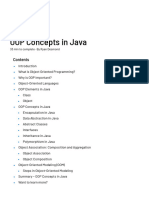Object-Oriented_Programming_OOP_in_Java
Uploaded by
someoneishere721Object-Oriented_Programming_OOP_in_Java
Uploaded by
someoneishere721Object-Oriented Programming (OOP) in Java
Object-Oriented Programming (OOP) in Java
OOP is a programming paradigm based on the concept of "objects", which combine data and
behavior. Java was designed with OOP principles in mind and supports encapsulation, inheritance,
polymorphism, and abstraction.
Key Concepts:
- Classes and Objects: Classes define blueprints; objects are instances.
- Encapsulation: Bundling data and methods while restricting direct access.
- Inheritance: Creating new classes from existing ones to promote code reuse.
- Polymorphism: Allowing objects to be treated as instances of their parent class.
- Abstraction: Hiding complex details while exposing essential features.
Example:
--------------------------------
class Animal {
void sound() {
System.out.println("Animal makes a sound");
}
}
class Dog extends Animal {
@Override
void sound() {
System.out.println("Dog barks");
}
}
public class TestOOP {
public static void main(String[] args) {
Animal myDog = new Dog();
myDog.sound();
}
}
--------------------------------
You might also like
- Principles of Object-Oriented Programming PDFNo ratings yetPrinciples of Object-Oriented Programming PDF17 pages
- EObject-Oriented Programming OOP in JavaNo ratings yetEObject-Oriented Programming OOP in Java2 pages
- Object-Oriented Programming (OOP) and Its Features: CopilotNo ratings yetObject-Oriented Programming (OOP) and Its Features: Copilot2 pages
- Object Oriented Programming (OOPs) Concept inNo ratings yetObject Oriented Programming (OOPs) Concept in7 pages
- Assignment 1 - Understanding the OOP in java - Richard C. CayabyabNo ratings yetAssignment 1 - Understanding the OOP in java - Richard C. Cayabyab4 pages
- Oops (Object Oriented Programming System)No ratings yetOops (Object Oriented Programming System)3 pages
- The Power of Object-Oriented Programming in JavaNo ratings yetThe Power of Object-Oriented Programming in Java2 pages
- Java OOP (Object Oriented Programming) : Programming Department Fifth Stage 2017-2018No ratings yetJava OOP (Object Oriented Programming) : Programming Department Fifth Stage 2017-201810 pages
- Principles of Object-Oriented Programming in JavaNo ratings yetPrinciples of Object-Oriented Programming in Java21 pages
- Java Notes with examples in detailed notesNo ratings yetJava Notes with examples in detailed notes273 pages
- Object-Oriented-Programming-OOP-ConceptsNo ratings yetObject-Oriented-Programming-OOP-Concepts7 pages
- Java Oops Concepts: Oops (Object-Oriented Programming System)No ratings yetJava Oops Concepts: Oops (Object-Oriented Programming System)5 pages
- Introduction To Object-Oriented Programming (OOP)No ratings yetIntroduction To Object-Oriented Programming (OOP)14 pages
- What Is Object-Oriented Programming - OOP Explained in Depth100% (1)What Is Object-Oriented Programming - OOP Explained in Depth23 pages
- CSC ASSIGNMENT on Object Oriented ProgrammingNo ratings yetCSC ASSIGNMENT on Object Oriented Programming31 pages
- 67152f5181f5719b33d05e5e MaravisefudikavNo ratings yet67152f5181f5719b33d05e5e Maravisefudikav2 pages
- Java Package Mastery: 100 Knock Series - Master Java in One Hour, 2024 EditionFrom EverandJava Package Mastery: 100 Knock Series - Master Java in One Hour, 2024 EditionNo ratings yet
- IGNOU PGDCA MCS 206 Object Oriented Programming using Java Previous Years solved PapersFrom EverandIGNOU PGDCA MCS 206 Object Oriented Programming using Java Previous Years solved PapersNo ratings yet
- Data Structures Arrays, Lists, Sets, MapsNo ratings yetData Structures Arrays, Lists, Sets, Maps1 page
































































